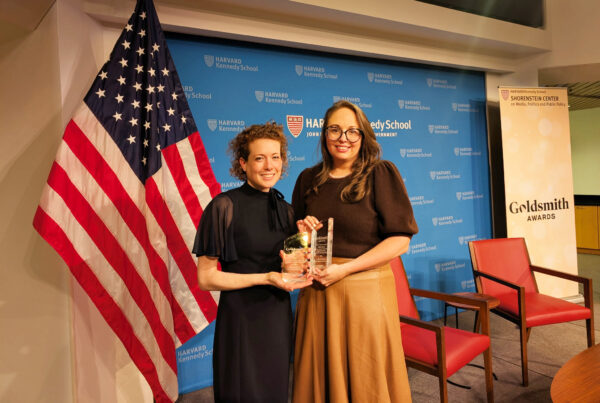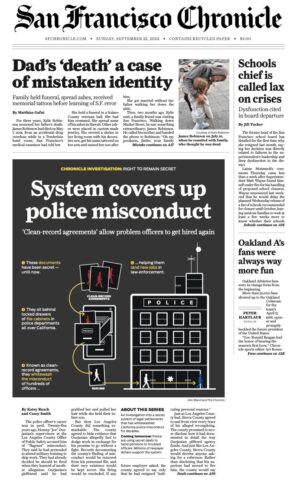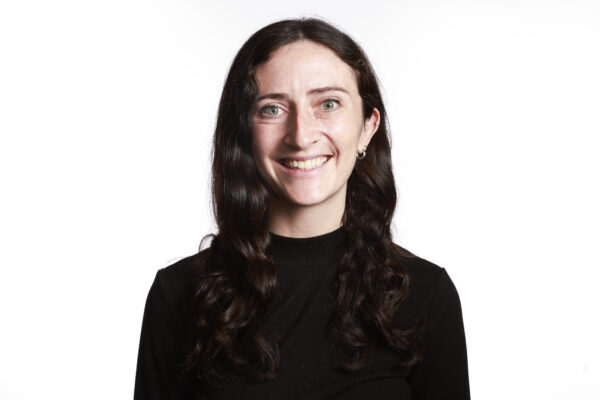
Casey Smith and Katey Rusch photographed with the 2025 Goldsmith Prize for Investigative Reporting at the awards ceremony on April 3, 2025, at the JFK Jr. Forum at Harvard’s Kennedy School of Government.
Alums Katey Rusch (’20) and Casey Smith (’20), have won the 2025 Goldsmith Prize for Investigative Reporting for “Right to Remain Secret,” the Shorenstein Center on Media, Politics and Public Policy at Harvard University’s Kennedy School of Government announced in an awards ceremony today.
The winning two-part investigative series, a collaboration between UC Berkeley’s Investigative Reporting Program and the San Francisco Chronicle, unveiled how multiple police agencies in California used secretive legal settlements to mask the misconduct of officers.
“We were ‘greenish’ reporters with an ambitious idea and you gave us all of your time and talent, and we are forever indebted to you for that,” Rusch said to Professor David Barstow and other editors and instructors at the Investigative Reporting Program, as she and Smith accepted the award.
Rusch and Smith also specifically thanked editor Demian Bulwa at the San Francisco Chronicle “for bravely publishing this story despite many officers asking us not to.” The reporters described themselves as “shell-shocked,” and expressed gratitude for now being in the company of other Goldsmith Prize-winning investigative reporters whose work they have always admired.
Rusch and Smith, who conceived of and reported the story at the Investigative Reporting Program, are the first to expose and explain how so-called “clean-record agreements” obscure police misconduct — including dishonesty, sexual assault and excessive force — and enable errant officers to start anew in other police agencies. Some even qualify for disability pensions.

The annual prize honors investigative reporting that best promotes more effective and ethical conduct of government, the making of public policy, or the practice of politics. The winner receives $25,000, and five finalists receive $10,000. The prize money is paid directly to the journalists, not the news organizations.
The win follows a string of national recognitions for the five-year investigation including the 2024 George Polk Award for Justice Reporting and the Selden Ring Award for Investigative Reporting.
The Journalist’s Resource, a project of Harvard Kennedy School’s Shorenstein Center, interviewed each of the finalists offering a behind-the-scenes look at the processes, tools and legwork it takes to create an important piece of investigative journalism. Read their’s here. Read a Berkeley Journalism Q&A with Rusch about the series here.
More from the Berkeley Journalism community honored
Others in the Berkeley Journalism community were also honored including an award-winning investigative reporter for The San Francisco Chronicle with a specialization in data journalism whose work has spurred inquiries by federal and state elected officials.

Susie Neilson (’19)
Susie Neilson (’19) was a finalist for the Goldsmith Prize for Investigative Reporting for “Fast and Fatal,” a year-long investigation that found that police pursuits now claim nearly two lives a day across the country. Through meticulous research and data gathering, the reporters unveiled that police chases resulted in over 3,300 deaths from 2017 through 2022, with a significant number of victims being bystanders or passengers, not the fleeing drivers.
Read her interview with the Journalist’s Resource, which shares tips for building a national database from scratch, interviewing trauma survivors, negotiating with public records officials and more here.
Shoshana Walter of The Marshall Project, named a finalist for her investigation “She Ate a Poppy Seed Salad Before Giving Birth. Then They Took Her Baby Away,” has been mentoring graduate students at Berkeley’s Investigative Reporting Program since the fall of 2024.
Watch the entire ceremony video here.
By Marlena Telvick, former deputy director of the IRP

The Investigative Reporting Program (IRP) is a professional newsroom and teaching institute at the University of California, Berkeley. We are committed to reporting stories that expose injustice and abuse of power while training the next generation of journalists in the highest standards of our craft. Established by Lowell Bergman in 2006, and now led by David Barstow, the first reporter ever to win four Pulitzer Prizes, the IRP has been a pioneer in the collaborative production of award-winning investigative reporting on multiple platforms. This innovation, now commonplace in the news business, has been recognized with the highest honors in journalism.
The program’s work has made it a model for nonprofit journalism based at a college or university that has been replicated around the world. Help us fearlessly tell stories that no one else is telling, while training the next generation of investigative reporters by donating here.
